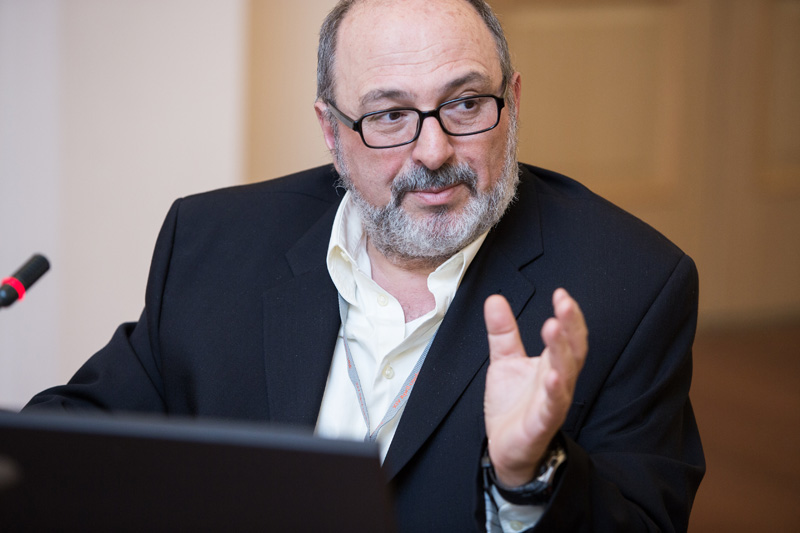'Science Knows No National Borders'

Foreign scientists successfully continue their work in HSE University laboratories, combining fundamental and applied research to achieve significant results. HSE News Service has spoken to Professor Panos Pardalos, Head of the Laboratory of Algorithms and Technologies for Networks Analysis at HSE University in Nizhny Novgorod, about its work.
— What brings you to HSE University in Nizhny Novgorod?
— Before joining HSE University, I had previously visited Nizhny Novgorod and thus have colleagues at Lobachevsky State University of Nizhny Novgorod, where I was appointed Honorary Professor in 2005. I therefore knew that many young researchers and reputable experts in mathematics and computer science worked in Nizhny Novgorod. When offered the opportunity to work there at the application stage in 2011, I agreed to participate as I already knew the city and its scientific environment.
I became the academic supervisor of the Laboratory of Algorithms and Technologies for Networks Analysis. The start of the mega-grants programme allowed us to attract many young researchers and employees of HSE University's Faculty of Business Informatics and Applied Mathematics and other research centres of Nizhny Novgorod.
— What are your key areas of research?
— We started with classical network optimisation problems, but now we pay significant attention to data mining and artificial intelligence. I recently gave a lecture on 'Artificial Intelligence and the Economics of Sustainable Development' as an invited speaker at the 25th Yasin Conference. We are constantly evolving and striving to be at the forefront of science by dealing with current topics. This is a natural progression for scientists who want to advance science and develop professionally.

The research we started with continues, although postgraduates and young employees are more interested in machine learning and artificial intelligence, as these subjects are in greater demand today. However, in science, everything is closely linked.
— How do fundamental and applied research combine?
— We began our applied research by studying the dynamics of networks in stock markets. In particular, we analysed the Russian stock market. We also studied networks of brain neurons and addressed the issue of transport routing for a large trading company. We strive to reach a balance between academic research and its real-life application. Our young employees have won numerous international and Russian competitions, including the Yandex scientific competition, IBM postgraduate grants, Yandex scholarships, and Moscow Government awards for young researchers. Many of our former employees have obtained senior positions in the IT departments of companies such as Sber, Yandex, Siemens, and Google, as well as in the research centres of other major corporations.
— Is it hard to combine scientific work in Russia and abroad?
— Not at all. Science knows no national borders. It makes no difference where you work. We publish everything we do, as we only do open research.

— One of your recent works focuses on the dynamics of natural and technogenic disasters. Can mathematical models help predict them?
— Conferences that discuss catastrophe dynamics and forecasting reflect the global nature of science. Last year's conference was held in Austria, the 2023 event took place in Greece, and this year's meeting will be held in China.
Studying dynamics involves trying to predict disasters and how to act when they occur. In China, for instance, landslides are common. We also study how to respond to tsunamis, earthquakes, epidemics, and massive power grid blackouts. More recently, we have started to forecast disasters related to the impact of space bodies, such as asteroids and comets.
—Which disasters are more difficult to forecast—natural or human-related?
—Both are difficult. Climate catastrophes and natural disasters caused by extreme weather and human activity are subject to certain cycles. Identifying, studying, and analysing their patterns is difficult.
— Have the global events of recent years affected your work?
— Scientists are more independent than politicians regarding their relationships with other countries. For example, Russia and the United States continue to collaborate on space exploration, and even during the Cold War, many Soviet scientific journals were translated in the USA. Science is a global legacy, and scientists should continue to collaborate for the benefit of humanity.
See also:
Advancing Personalised Therapy for More Effective Cancer Treatment
Researchers from the International Laboratory of Microphysiological Systems at HSE University's Faculty of Biology and Biotechnology are developing methods to reduce tumour cell resistance to drugs and to create more effective, personalised cancer treatments. In this interview with the HSE News Service, Diana Maltseva, Head of the Laboratory, talks about their work.
‘Our Task Is to Promote and Popularise Native Languages’
The Centre for the Study of Native Languages at Dagestan State University (DSU) is actively engaged in researching the many languages spoken by the peoples of Dagestan. The republic has 14 official state languages, many of which have their own dialects and varieties. Scholars from Dagestan plan to adopt corpus-based methods of linguistic research used at HSE University and intend to collaborate with HSE’s Linguistic Convergence Laboratory. The HSE News Service spoke with the centre’s Director, Prof. Marina Gasanova, who is currently undertaking a research placement at HSE University.
Designing an Accurate Reading Skills Test: Why Parallel Texts are Important in Dyslexia Diagnosis
Researchers from the HSE Centre for Language and Brain have developed a tool for accurately assessing reading skills in adults with reading impairments. It can be used, for instance, before and after sessions with a language therapist. The tool includes two texts that differ in content but are equal in complexity: participants were observed to read them at the same speed, make a similar number of errors, and understand the content to the same degree. Such parallel texts will enable more accurate diagnosis of dyslexia and better monitoring of the effectiveness of interventions aimed at addressing it. The paper has been published in Educational Studies.
A Space for Economic Experimentation: LEEF Organises Workshop for Early-Career Researchers
In early September 2025, the renewed Laboratory for Experimental Economics and Finance (LEEF) held its first workshop for early-career researchers. Its main distinguishing feature was that every presentation was based on the results of laboratory economic experiments. In particular, the speakers discussed what people consider a fair deal, how best to motivate employees, and how genes influence the willingness to cooperate and help others. All interested students and postgraduates were invited to collaborate with the laboratory.
HSE Researchers Determine Frequency of Genetic Mutations in People with Pulmonary Hypertension
For the first time in Russia, a team of scientists and clinicians has conducted a large-scale genetic study of patients with pulmonary arterial hypertension. The team, which included researchers from the International Laboratory of Bioinformatics at the HSE Faculty of Computer Science, analysed the genomes of over a hundred patients and found that approximately one in ten carried pathogenic mutations in the BMPR2 gene, which is responsible for vascular growth. Three of these mutations were described for the first time. The study has been published in Respiratory Research.
Similar Comprehension, Different Reading: How Native Language Affects Reading in English as a Second Language
Researchers from the MECO international project, including experts from the HSE Centre for Language and Brain, have developed a tool for analysing data on English text reading by native speakers of more than 19 languages. In a large-scale experiment involving over 1,200 people, researchers recorded participants’ eye movements as they silently read the same English texts and then assessed their level of comprehension. The results showed that even when comprehension levels were the same, the reading process—such as gaze fixations, rereading, and word skipping—varied depending on the reader's native language and their English proficiency. The study has been published in Studies in Second Language Acquisition.
Scientists Discover How Correlated Disorder Boosts Superconductivity
Superconductivity is a unique state of matter in which electric current flows without any energy loss. In materials with defects, it typically emerges at very low temperatures and develops in several stages. An international team of scientists, including physicists from HSE MIEM, has demonstrated that when defects within a material are arranged in a specific pattern rather than randomly, superconductivity can occur at a higher temperature and extend throughout the entire material. This discovery could help develop superconductors that operate without the need for extreme cooling. The study has been published in Physical Review B.
'Biotech Is Booming Worldwide'
For more than five years, the International Laboratory of Bioinformatics at the HSE Faculty of Computer Science has been advancing cutting-edge research. During this time, its scientists have achieved major breakthroughs, including the development of CARDIOLIFE—a unique genetic test unmatched worldwide that predicts the likelihood of cardiovascular disease. With the active participation of HSE students, including doctoral students, the team is also working on a new generation of medicines. In this interview with the HSE News Service, Laboratory Head Maria Poptsova shares insights into their work.
Civic Identity Helps Russians Maintain Mental Health During Sanctions
Researchers at HSE University have found that identifying with one’s country can support psychological coping during difficult times, particularly when individuals reframe the situation or draw on spiritual and cultural values. Reframing in particular can help alleviate symptoms of depression. The study has been published in Journal of Community Psychology.
'Today, Human Existence Without Mathematics Is Difficult; Tomorrow, It Will Be Simply Impossible'
Mathematicians around the world share a common language and continue to collaborate despite the challenges of recent years. The hub of mathematical networking has been shifting to China, where scientists from various countries meet at conferences and other academic events. Partnerships with leading Chinese universities offer promising opportunities to strengthen existing ties and forge new ones. In this interview with the HSE News Service, Valery Gritsenko, Head of the HSE International Laboratory for Mirror Symmetry and Automorphic Forms, discusses this and other topics, including what AI is and why the state should engage with mathematicians.


